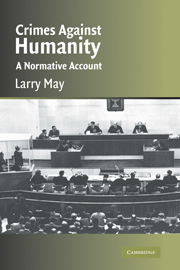Book contents
- Frontmatter
- Contents
- Acknowledgments
- A UNIVERSAL NORMS AND MORAL MINIMALISM
- B PRINCIPLES OF INTERNATIONAL CRIMINAL LAW
- C PROSECUTING INTERNATIONAL CRIMES
- 7 Prosecuting “Minor Players” for Crimes Against Humanity
- 8 Prosecuting State Leaders for Crimes Against Humanity
- 9 Prosecuting Genocide Amidst Widespread Complicity
- D DEFENSES AND ALTERNATIVES
- Conclusions
- Notes
- Bibliography
- Index
8 - Prosecuting State Leaders for Crimes Against Humanity
Published online by Cambridge University Press: 23 November 2009
- Frontmatter
- Contents
- Acknowledgments
- A UNIVERSAL NORMS AND MORAL MINIMALISM
- B PRINCIPLES OF INTERNATIONAL CRIMINAL LAW
- C PROSECUTING INTERNATIONAL CRIMES
- 7 Prosecuting “Minor Players” for Crimes Against Humanity
- 8 Prosecuting State Leaders for Crimes Against Humanity
- 9 Prosecuting Genocide Amidst Widespread Complicity
- D DEFENSES AND ALTERNATIVES
- Conclusions
- Notes
- Bibliography
- Index
Summary
Crimes against humanity are crimes organized by a State or State-like entity against a population or other group of people. Historically, it was States that were thought to be the only parties that should be sanctioned internationally when mass crimes occurred. By contrast, international criminal law has developed in the last fifty years on the assumption that individuals should be prosecuted for such mass crimes. But how are the acts of individuals related to the actions of a State? And which individuals should be subject to punishment for such mass crimes as ethnic cleansing? In Chapter 7, I looked at non-leaders, and argued that it should be hard to convict minor players for crimes against humanity. In this chapter, I show that heads of State should not be so easily relieved of responsibility. Even though I generally take a defendant-oriented approach to prosecutions in international criminal law, I do not think that we should be sympathetic to those heads of State who claim to be immunized against international criminal charges merely because they were acting in their official capacities.
In this chapter, I will argue that the individual who should be prosecuted for a crime against humanity is normally the head of State. I will argue that the behavior of heads of State best satisfies the actus reus and mens rea requirements for being individually culpable for crimes against humanity.
- Type
- Chapter
- Information
- Crimes against HumanityA Normative Account, pp. 139 - 156Publisher: Cambridge University PressPrint publication year: 2004
- 1
- Cited by

